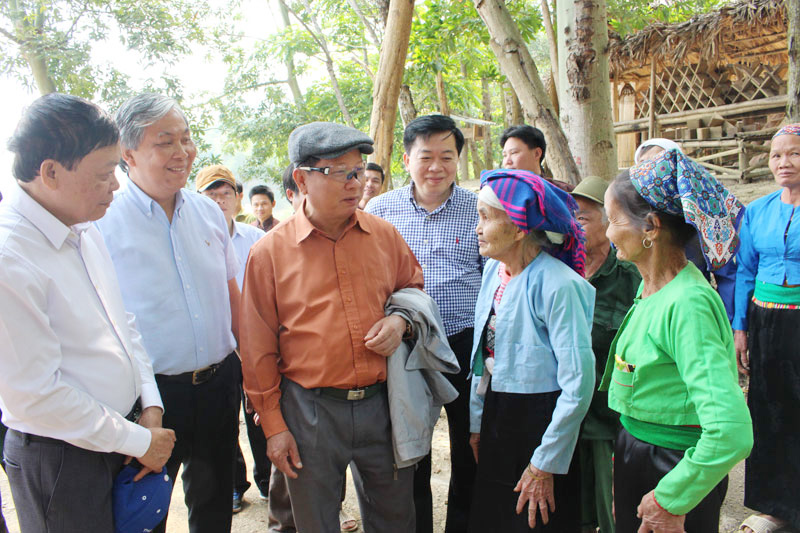
(HBO) - On March 23, Bui Van Tinh, member of Central Party Committee and Secretary of the provincial Party Committee, inspected progress of some relic preservation and tourism projects in Hoa Binh Lake area. He was accompanied by Nguyen Van Chuong, Vice Chairman of the provincial People's Committee.

Secretary of
the provincial Party Committee Bui Van Tinh inspected and heard a report on progress
of a project on preservation of Thac Bo Temple historical relic site (Vay Nua -
Da Bac).

Secretary of the
provincial Party Committee Bui Van Tinh explores Hoa Binh Tourism JSC’s homestay
tourism model in Ngoi village (Ngoi Hoa - Tan Lac).
The Le Loi Stele preservation and restoration project (Vay Nua -
Da Bac), implemented by the provincial Department of Culture, Sports and
Tourism, is in the first phase with a total investment of nearly 16 billion VND.
The project spans 0.6ha. The project has invested in boat stations, exteriors,
temples, stone embankments, electricity and water systems, fulfilling 80
percent of the total workload. The second phase will operate in the form of BT
public private partnership.
Covering 138 hectares of land, the Sung Island tourism project
(Tien Phong - Da Bac) costs about 400 billion VND invested by the Hoa Binh
Tourism Investment JSC. The project is set to build a complex of dining,
entertainment, and conference areas, and luxury apartments. At present, the
installation of electricity system has been completed while construction of an
internal road system is underway. It is expected to put into operation a number
of facilities in April 2019.
Tinh paid a visit to the Hoa Binh Lake Ecotourism Resort and
Ecotourism Project in Liem village (Ngoi Hoa - Tan Lac) invested by the Lac
Hong investment company. The project has completed a 1:500 scale detailed plan.
It is expected to build a system of hotels, villas, restaurants, wharves,
eco-sports area on over 30 hectares, with a total investment of about 800
billion VND.
He also explored Hoa Binh Tourism JSC’s homestay tourism model in
Ngoi village (Ngoi Hoa - Tan Lac).
According to Tinh, the Hoa Binh Lake area has great potential
for the development of spiritual, eco-, cultural and resort tourism. The
province welcomes and creates the most favorable conditions for investors to run
their projects in the area, in order to turn Hoa Binh Lake into a national
tourist site by 2025, he said.
He asked relevant agencies and localities to further accelerate
administrative reform in order to attract investment and promptly remove
obstacles for investors./.
Hoa Binh province is undergoing a dynamic transformation amid Vietnam’s national digital transition. Building on Poliburo’s Resolution No. 57-NQ/TW on breakthroughs in science, technology, innovation, and national digital transformation, the province has rolled out a wide range of practical action plans. A standout initiative is the "Digital Literacy for All” movement, an effort to ensure that no one is left behind in the digital era.
Hoa Binh province is undergoing a dynamic transformation in the wake of the national digital transformation movement. Building on Resolution No. 57-NQ/TW of the Politburo on breakthroughs in science, technology, innovation, and national digital transformation, the province has implemented a wide range of practical action plans. A standout initiative is the "Digital Literacy for All” movement ambitious effort to ensure that no one is left behind in the digital age.
With a spirit of unity and proactive problem-solving, the Party Committee, the government and the people of Dong Lai Commune (Tan Lac District) have made great strides in implementing the resolutions of the 24th Party Congress of the commune for the 2020 - 2025 term. Focusing on leadership and practical actions, the commune has brought the Party’s resolutions into daily life, creating strong impacts and pushing the local development forward.
Amid the nationwide push for digital transformation, young people in Hoa Binh Province are stepping up as dynamic pioneers, applying technology to enhance Youth Union operations and expand the reach of youth-led initiatives. Through creativity and adaptability, Youth Union organizations at all levels have introduced a series of practical solutions, contributing to modern governance and community development.
In recent years, An Nghia commune, located in Lac Son district, has stepped up administrative reform, focusing on improving the quality and efficiency of its single-window service unit for receiving and processing administrative procedures. These improvements have helped create favourable conditions for local residents and organisations to handle administrative procedures, contributing to the commune’s broader socio-economic development.
The Prime Minister-approved master plan to develop the multi-use value of forests ecosystems through 2030, with a vision to 2050, aims to improve the management and sustainable use of forest resources, create jobs, increase incomes, and improve the living standards of ethnic minorities, people in mountainous and remote areas, forest workers and those living near forests.




